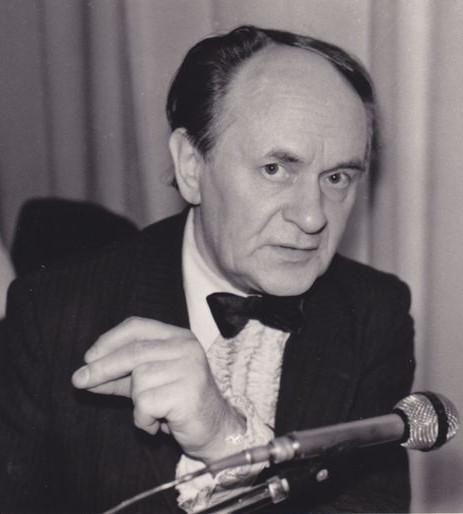
Yuri Glagolev
(08.10.1926 - 13.08.2013 )
“After seeing Prince Igor at the Latvian National Opera as a child, I became obsessed with opera. I prepared for a long time before beginning to write for opera myself; it seemed to me that I still needed to learn, to know how to do it. But with opera, I’m in my element. Sometimes at tea evenings hosted by pianist Valery Zost, he would ask me to sing and play the scene in the countess’ bedroom (from Tchaikovsky’s opera The Queen of Spades)... I like deep emotion, drama. I do not like superficiality. I’m convinced that the presence of humanity in art and music must be emotional, national
and tonal.”
Imagination, aspiring to truly dramatic content – even in his later years, these were serious qualities for Yuri Glagolev as a composer. Another important quality was his honest awareness of his journey, which he most likely acquired while growing up in an intellectual home environment as the descendant of Russian clergymen. Ever since the Third Awakening in Latvia, Glagolev’s name has been increasingly heard in concerts of the Orthodox Church. But this stage in his life was also accompanied by other, no less spiritual, interests.
Glagolev was born into an old family of Orthodox clergymen. His great-great- grandfather was the protohiereus of the Tula Orthodox Cathedral, and subsequent generations were also members of the clergy. His father, Vladimir Glagolev (1898–1970), who was a choir regent and composer of sacred music, began his career in music in the churches of Dvinsk (now Daugavpils), conducting Orthodox choirs in Daugavpils, Riga and various cities throughout Russia and also leading the “Bayan” Riga Russian Society mixed choir (1942–1940). Vladimir Glagolev studied composition at the Latvian Conservatory under Prof. Jāzeps Vītols (1927–1929). He is currently known to have composed more than 100 sacred works for choir, including thirty-four from the Всенощное бдение (Vespers in the Catholic Church), forty from the Liturgy of Saint John Chrysostom (Литургия Св. Иоанна Златоуста) and others. One of his compositions, Во Царствии Твоем (In Your Kingdom), was published in 1965 in Berkeley, California. In 1968, the Patriarch of Moscow and All Russia awarded Vladimir Glagolev with the Order of Grand Duke Vladimir, 3 rd Class.
Yuri Glagolev was born on October 8, 1926, in Riga. He attended the Jūlijs Majevskis music studio and later studied clarinet under Hildegarde Plūme (the assistant to Nadežda Kārkliņa at the Latvian Conservatory) as well as harmony under Jēkabs Kārkliņš (privately from 1942 to 1944, at the Latvian State Conservatory from 1945 to 1946). His mother played a key role in the development of his musical skills. After graduating from the Russian Gymnasium, Glagolev continued his education in three separate departments at the Latvian State Conservatory: choral conducting (under Jēkabs Mediņš, 1945–1947), piano (Valery Zost, 1947–1950) and composition (Valentīns Utkins, whose class Glagolev graduated from with distinction in 1951). He completed his post-graduate studies at the Moscow State Conservatory under Yuri Shaporin (1951–1952). In 1951 he was admitted to the Latvian (and USSR) Composers’ Union, of which he remained a member for the rest of his life.
Glagolev’s compositions quickly gained high-level recognition in the music world. After performing Andante with violinist Lida Rubene at the All-Union Composition Students’ Review Concert in Moscow in 1949, the young composer received a national-level commission from the USSR Arts Committee – the Sonata for Violin and Piano (the Andante later became its slow movement). Glagolev’s success as a composer was confirmed by his victory at the 7 th World Festival of Youth and Students competition in Vienna (1959), where his song “Дружба нам нужна” (We Must Be Friends) won 2 nd prize and the silver medal. Over the years, several other songs by Glagolev with similar themes received awards.
Glagolev worked in a variety of positions. In the postwar years (1940s–50s), he led arts activities in orphanages, the Riga Porcelain and Faience Factory and elsewhere. He was also one of the chief preparatory conductors of the Song Festival in the city of Riga (1953–1958). He performed his songs in the Decade of Latvian Art and Literature in Moscow in the late 1950s, in 1957 he was a soloist (pianist, singer) and concertmaster with the Dagestan ASSR State Philharmonic, and he performed many concerts throughout southern Russia. For a short time he taught instrumentation and arrangement at the Latvian State Conservatory (1972–1976). The heavy representation of vocal genres in Glagolev’s oeuvre is linked to the composer’s career as a performer, which was largely inspired by the ideals of democratic artistic activity, but also by his interest in sacred music and musical theatre. Much of his vocal music incorporated lyrics written by his friend, the poet Vladimirs Mirskis (a former associate professor of philology at the University of Latvia), some of which was inspired by the student folklore expeditions to Russia that Mirskis led in the 1960s–70s (such as the song “Я иду по Росии” [I Walk Through Russia]) as well as Glagolev’s own concert tours along the Volga River in the 1970s and 80s (“Песня о Волге” [Song of the Volga]).
Glagolev’s work in the genre of sacred music is perhaps less well known but was nevertheless personally very significant for the composer himself. He was the choir regent at the Michael the Archangel Church in Riga (Михайло-Архангельская церковь, 1945–1947); in subsequent years he sang in the Pokrov and All Saints Churches (Покровская, Всехсвятская церковь) as well as the Nativity of Christ and Holy Trinity Cathedrals (Христо-Рождественский, Свято-Троицкий собор) under the direction of his father and served as the regent of the archiereus choir at the Holy Trinity Cathedral (1992–1995). From 1988 onward he was the artistic director and conductor of the Perezvoni (Bells) Russian choir. Glagolev was admitted to the Irina Arkhipova Foundation of the International Music Union in Moscow in 1995.
Lolita Fūrmane © LMIC
